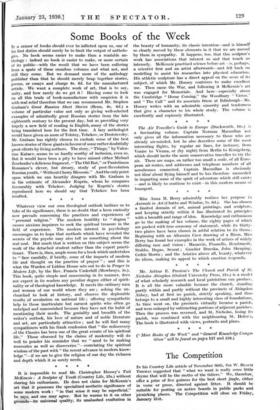Whatever view our own theological outlook inclines us to take
of its significance, there is no doubt that a keen curiosity now prevails concerning the practices and experiences of " personal religion." The modern hostility to " dogma " causes anxious inquirers to seek the spiritual treasure in the field of experience. The modern interest in psychology encourages us to hope that methods which have revealed the secrets of the psyche may also tell us something about the real soul. But much that is written on this subject seems the work of the detached student rather than the expert practi- tioner. There is, then, ample room for a book which undertakes to " face candidly, if briefly, some of the impacts of modern life and thought on the practice of prayer " ; and this is what the Warden of Liddon House sets out to do in Prayer in Modern Life, by the Rev. Francis Underhill (Mowbrays, 5s.). This book, quite simple and unassuming in its manner, does not expect in its readers any peculiar degree either of spirit- uality or of theological knowledge. It meet's the ordinary men and women of our world where they are ; asking the un- churched to look at history, and observe the deplorable results of secularism on national life ; offering sympathetic help to thoge inarticulate but earnest spirits who often go unhelped and unnourished because they have not the habit of mentioning their needs. The geniality and breadth of the writer's outlook, his love of nature and of noble literature and art, are particularly attractive ; and he will find many sympathizers with his frank confession that " the rediscovery of the Classics has been one of the great events of his spiritual life." Those obsessed by the claims of modernity will do well to ponder his reminder that we " need to be making recoveries as well as discoveries "—correlating the spiritual wisdom of the past with " the recent advance in modern know- ledge "—if we are to give the religion of our day the richness and depth which it so sorely needs.






































 Previous page
Previous page